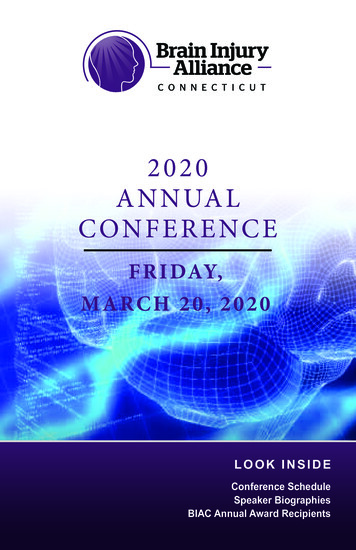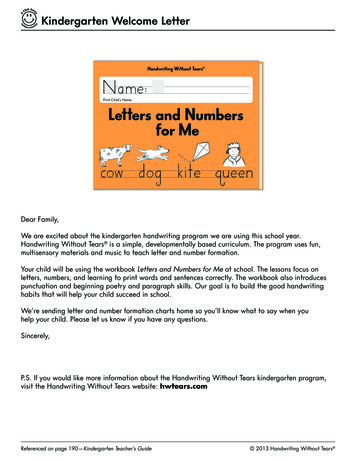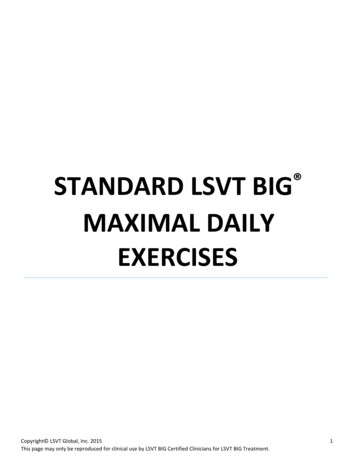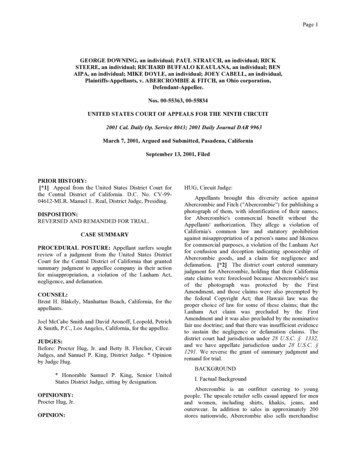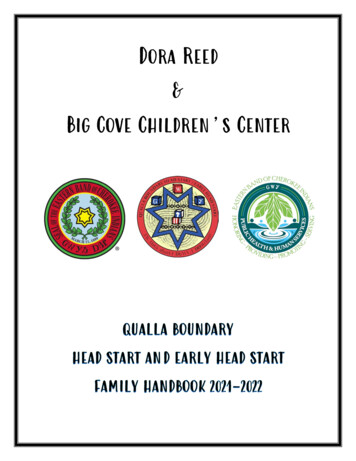
Transcription
Dora Reed&Big Cove Children’s Center
INFORMATIONMy Child’s Head Start Center:Telephone #:My Child’s Teacher:My Child’s Teacher:My Child’s Teacher:My Child’s Center Director:My Child’s Bus Driver:My Child’s Family Support Coordinator:EMERGENCY NUMBERSMy Child’s Doctor:Telephone #:My Child’s Dentist:Telephone #:Dispatch #:828.497.4131Local Police #:Fire Department #:Poison Control Center #: 1.800.222.1222***PLEASE CALL THE CENTER WHEN YOUR CHILD WILL BE ABSENT.CONSISTENT ATTENDANCE IS VERY IMPORTANT FOR YOUR CHILD’S LEARNINGAND SKILL BUILDING. ***1
TABLE OF CONTENTSQUALLA BOUNDARY HEAD START/EARLY HEAD START INFORMATIONProgram Calendar 4-6History of Qualla Boundary Head Start .7Cultural Statement .8Philosophy .9Guiding Principles .10-11Program Five-Year Goals .12-13What is HS/EHS? .14PARENT RULES AND EXPECTATIONSArrival Time .15Parent Code of Conduct . . .16-17Parent’s Responsibilities .18Enrollment Responsibilities .19Parent’s Rights .20Attendance Policy .21Attendance Development Plan Example .22Behavior Policy 23-27Challenging Behavior Policy 28-29Discipline Policy . 30-31Parent Involvement 32Inclement Weather . . .33Release of Children . 34Dropping Children Off and Picking Children Up. .35Pedestrian Safety . . .36Children’s Clothing .37INVOLVING PARENTS IN HEAD STARTVolunteer Requirements . . .38Parents as Volunteers .39Volunteer In-Kind . . .40Parent Committee Meetings . . .41Parent Committee By-laws 42Policy Council .43FAMILY SERVICES AND INFORMATIONFamily Services .44Confidentiality .45Court and Custody Orders 46Mandated Reporting . 47HEALTHExclusion and Re-admission .48-49Lice Policy . .50-51Use of Bug Spray and Sunscreen .52Medication/Action Plans .53Allergens and Allergic reactions .54-55Anaphylaxis .56-572
Nutrition 58Program Mealtime Approach .59Screenings .60Special Needs 61EDUCATIONEducational Services .62The Creative Curriculum . 63Developmental Assessments & TS Gold Data Check Points . .64TS Gold Outcomes Chart .65Transitioning: Head Start to Kindergarten . . .66School Readiness . .67Classroom Information .68Infant Safe Sleep . . .69-70Shaken Baby Syndrome and Abusive Head Trauma .71Daily Health Checks .72Home Visit and Parent Teacher Conference .73Daily Schedule – Head Start & Early Head Start . 74Field Trips and Outside Center Walks .75BUS TRANSPORTATIONBus Rider Eligibility .76Bus Rider Rules 77Bus Rider - Behavior Bus Policy . .78NATURAL DISASTER PROCEDURESFloods .79-80Thunderstorms .81Tornadoes 82-83Evacuations .84-85Fire Drills and Fire Safety 86-87FACILITY SECURITYEarly Dismissal .88Building Security . .89Shelter in Place .90-91Active Shooter .92Unauthorized Persons on Premises .93Lockdown Procedures .943
School Calendar 2021-2022July 202121222326-30Parent/Grandparent/Fatherhood ActivityLast Day of 2019-2020 school yearPre-Service TrainingPre-Service TrainingAugust 20212-65691719242631Pre-Service TrainingEarly Head Start Open House: 4-6pmHead Start Open House: 4 - 6pmFirst Day of SchoolParent/Grandparent Activity – 5:00pmFatherhood Activity – 5:00pmParent Meeting – 5:00pmClosed: Holiday – Elder’s DayParent Training – 5:00pmSeptember 20213Close Early at 12:45pm: Holiday – Labor Day6Closed: Holiday – Labor Day14Parent/Grandparent Activity – 5:00pm16Fatherhood Activity – 5:00pm21Parent Meeting – 5:00pm23Parent Training – 5:00pm24Closed: In-Service TrainingOctober 20215Close Early @ 12:45pm: Parade Day6Closed: Heritage Day12Parent/Grandparent Activity – 5:00pm14Fatherhood Activity – 5:00pm19Parent Meeting – 5:00pm21Parent Training – 5:00pm28Halloween Trick or Treat Day*29Closed: In-Service Training4
November 20214Parent Training – 5:00pm9Parent Meeting – 5:00pm11Closed: Holiday – Veteran’s Day16Dora Reed and Big Cove’s Thanksgiving Lunch18Parent/Grandparent/Fatherhood Activity – 5:00pm24Closed: Holiday – Thanksgiving25Closed: Holiday – Thanksgiving Day26Closed: Holiday – Tsali DayDecember 20212Parent Meeting – 5:00pm7Fatherhood Activity – 5:00pm9Parent/Grandparent Activity & Parent Training – 5:00pm20-24Closed: Holiday – Christmas30-31Closed: New Year’s EveJanuary 202213Parent/Grandparent Activity & Parent Training – 5:00pm17Closed: Holiday – Martin Luther King Day18Parent Meeting – 5:00pm20Fatherhood Activity – 5:00pm28Closed: In-Service TrainingFebruary 202210Parent/Grandparent Activity & Parent Training – 5:00pm15Fatherhood Activity – 5:00pm17Parent Meeting – 5:00pm21Closed: Holiday – President’s Day25Closed: In-Service TrainingMarch 202210152425Parent Meeting – 5:00pmParent/Grandparent ActivityFatherhood Activity & Parent Training – 5:00pmClosed: In-Service Training5
April 20225121415181929Parent Training – 5:00pmParent/Grandparent Activity – 5:00pmFatherhood Activity – 5:00pmClosed: Holiday – Good FridayClosed: Holiday – Easter HolidayParent Meeting – 5:00pmClosed: In-Service TrainingMay 202212171924262730Fatherhood Activity – 5:00pmParent Meeting – 5:00pmParent Training – 5:00pmParent/Grandparent Activity – 5:00pmClosed: In-Service TrainingClosed: Holiday – Memorial DayClosed: Holiday – Memorial DayJune 20221423TBATBAParent/Grandparent/Fatherhood Activity– 5:00pmParent Meeting – 5:00pmParent Training – 5:00pmHead Start Year End CeremoniesJuly 20221452123TBATBATBA – possible holiday closureClosed: Holiday – Independence DayTBA – possible holiday closureParent/Grandparent/Fatherhood ActivityParent Meeting – 5:00pmParent Training – 5:00pmLast day of school yearMark your calendar - This list of holidays and center closings will allow you, the parent, to makenecessary arrangements as we close for holidays, in-service training, etc. Note: Closings mayvary depending on trainings, changes in scheduling, and administrative leave.6
HISTORY OF QUALLA BOUNDARY HEAD STARTThe Qualla Boundary Head Start program began its implementation in 1966. The Head Startprogram is one of the few surviving early education programs implemented in the 60’s “War onPoverty.” Head Start’s basic goal is to aid low-income families in becoming major figures in thesocial and economic systems of our society. This goal is accomplished by working with familiesto raise their self-esteem, aiding goal setting, improving health and welfare, and helping themlearn life skills to reach their fullest potential.The Child Development facet of the Dora Reed QBHS/EHS program began with the opening ofthe Youngdeer Child Development for children ages 2 to 5 years. The Youngdeer Center servedchildren and families as private payers and was subsidized by the state of North Carolina.Child Development services were provided at the Dora Reed Children’s Center for 20 children.The slots were provided to private paying and subsidized children. Also, the Child Developmentprogram committed to using the Head Start Performance Standards as the standard for serviceprovision.The First Start Nursery Infant/Toddler Center began in 1986 and provided services to 53 childrenaged 0 to 3. These were private paying and subsidized children using the Early Head StartPerformance Standards as the standard for service provision.Funding was available in February 2000 to start the construction of a new Infant/Toddler facilityto adjoin the Dora Reed Children’s Center. The 10-classroom facility was completed in Januaryof 2001. The babies that attended First Start Nursery made a smooth transition into the newfacility. During this time, plans were underway to apply for Early Head Start funding. EarlyHead Start was awarded in the summer of 2001 and planning was implemented to begin servicesin the fall of 2001. Early Head Start services have been provided to 48 infants, 10 pregnantwomen, and 12 Home-based families.Today, the two programs are operating under three separate licensures, i.e. Big Cove Children’sCenter (serves 28 children), Dora Reed Children’s Center (serves 144 children) and Early HeadStart (serves 86 children). The Big Cove Center operates under the Head Start program, but hasits own license separate from the Dora Reed Children’s Center because it is in a separatelocation. There are no childcare fees for EHS or HS - it’s FREE!!!We encourage attachment and continuity for our children by having teachers and studentstransition through our program together. Our early education program continues to search fornew innovative ideas for improving the care and success of our students that they enter PreKindergarten or elementary school with a love of learning and a firm foundation which willserve them throughout their schooling and life.7
CULTURAL STATEMENTAccording to the Multicultural Principles for Head Start Programs, “knowledge of culture andhome languages is essential to providing effective Head Start services. Head Start has a longhistory of serving linguistically diverse populations. It is important to individualize services sothat every child and family feels respected and valued and can grow in accepting andappreciating differences. Children acquire cultural knowledge as they develop language, learnconcepts, and experience the ways they are cared for by their parents and family members.Children also acquire cultural knowledge from their communities and Head Start experiences.”Head Start’s policy on tribal language preservation & revitalization: 1302.36-A program thatserves American Indian and Alaska Native children may integrate efforts to preserve, revitalize,restore, or maintain the tribal language for these children into program services.Research about the influences of culturally based education on the academic performance ofNative American children shows that interweaving cultural topics with daily activitiesstrengthens their identity and leads to better outcomes for all students. Research also shows thatcultural contexts affect young children’s cognitive, social and emotional development as well astheir approaches to learning.There are several important points to know about culture in the classroom: Culturally based education recognizes the language, experiences, values and knowledge of children, theirfamilies and their communities.Culture is real and important. For Head Start programs, it is necessary to respect and incorporate families’cultures into the systems and services provided.Culture is the context in which children develop and learn. Children’s learning is enhanced when theirculture is respected and reflected in all aspects of the program.By providing children with the opportunity to learn the language of their family’s culture, you are helpingchildren to develop a cultural identity and connection to their family roots.Incorporating culture into the classroom involves including elements of children’s home cultureinto the daily curriculum. It can include counting in the language spoken by children’s familiesin addition to counting in English; choosing themes that reflect the local environment; buildingon children’s prior experiences; and encouraging community members to take an active part insupporting children’s learning.The literacy center contains hundreds of books geared toward your little one. There are boardbooks for infants and toddlers and larger books for preschool age children. The purpose of theliteracy center is to cultivate a love of books and reading between caregiver and child. In doingso, the child develops a reading habit that will hopefully continue through their life. Studiesshow developing healthy reading habits has a positive impact on brain development andacademic success.One such way to help foster a love for reading is the book club. You keep track of the books thatyou read with your child and turn the reading log into the Literacy/Multi-Cultural Coordinator.Every book counts, even the ones you read over and over. Children that read at least 50 books(and every 100 books after) will have their picture put on the book club wall outside the LiteracyCenter and will receive a certificate, goody bag, and the opportunity to pick out a book to keep.Revisiting and Updating the Multicultural Principles for Head Start Programs Serving Children Ages Birth to Five, 2008.8
PHILOSOPHYQBHS/EHS believes that all children share basic needs and have a right to have those needs met.We believe that each child is unique and that we as a program need to use their uniquecharacteristics to tailor experiences and learning opportunities to meet their unique needs andgoals. Moreover, each individual has a unique value and a basic need to be respected, to berecognized, and to be needed. We further believe that children benefit most from comprehensiveprograms that provide a broad range of services and the child’s entire family, as well as, thecommunity must be involved. Our program will maximize the strengths and unique culture ofeach child and his/her family, in an effort to help him/her develop into socially, competent,productive member of society. We believe that our Cherokee culture and language is rich andimportant to our children and future generations so we will strive to preserve it, strengthen it andteach it within the curriculum chosen for implementation of our program.9
GUIDING PRINCIPLESfor our program To create an awareness in the community that we are a leader in Early ChildhoodDevelopment and Education. To be viewed as an integral part of our community. To be a trusted and valued community resource and an important enhancement tothe community. To continue to bring awareness about the program’s impact on families throughacademic, economic, and social progress. To be a process of serving others To be reflective and inclusive of the diversity of the communities. To maintain a safe and healthy environment. To hire and maintain qualified teaching staff that care for and love the children To strive to engage parents at every level of the Head Start/Early Head Startprogram.for our children To foster an environment which encourages creative problem solving,individuality, and responsibility. To lay the foundation for a love of lifelong learning. To guide children in the decision-making process To nurture the whole child – socially, emotionally, physically, and cognitively. To provide for children’s individual needs and interests. To enrich the lives of children by providing excellence in educational opportunitiesto promote lifelong success and enhance each child’s strengths. To encourage self-confidence, self-expression, self-discipline, and curiosity. To maintain and improve the child’s health. To provide awareness of various cultures and respect each child’s uniqueness. To be an active advocate on the child’s behalf.for our families To empower families and reinforce learning in the home because the parent is thechild’s first teacher. To be responsive to the needs of our families as they prepare for purposeful andproductive lives. To partner with families in establishing and attaining their individual goals. To respect the individual beliefs of each family.for our communities To lay the foundation for community pride, involvement, and service To ensure the community understands the early childhood development profession To educate the community on the needs of very young children age 0-5 years. To work cooperatively with other community resources to build and strengthenservices for very young children.10
for our staff To be valued by our peers in the community. To seek higher education in the form of an Associate’s, Bachelor’s and or Master’sdegree To seek and celebrate staff excellence. To promote an environment in which teamwork is integral. To develop and foster pride in our program and our grantee. To continue to provide a variety of opportunities for planed and individualizedprofessional development. To expect the highest ethical, moral, and professional standards at entry level. To nurture each individual staff member’s whole self (physical, emotional, andmental wellness) in a way that exceeds expectation. To abide by the Tribal Personnel Policies and procedures.11
PROGRAM GOALSEstablishing Measures for Objectives/ActivitiesGoal 1Provide supportive services toimprove quality of life forchildren and familiesGoal 2Build School Readiness so that childrenenter kindergarten preparedGoal 3Improving Health & Wellness forchildren, families, and staffObjective 1 for Goal 1Providing supportive resourcesand services for substanceabuse familiesObjective 1 for Goal 2Objective 1 for Goal 3Continue to utilize Creative Curriculumfor intentional teachingActively track BMI for children toensure health is improvingAssociated MeasuresAssociated Measures% of lesson plans requiring follow-upbased on comparison of fall and winterassessments for 27 classrooms% of children with high BMI for HS &EHS% of teachers forming lesson plansfrom assessment data results for 27classrooms100% of menus reviewed andapproved by Nutritionist (Portion sidespros and cons?)Associated MeasuresNumber of families who aredealing with substance abuseand family crisis identifiedwithin the PIR% of families identified whohave received information orresources for assistance withsubstance abuse or family crisis100% of classrooms working with localpartnerships on gardeningObjective 2 for Goal 1Ensure that Grandparents havethe resources necessary forraising grandchildrenAssociated MeasuresNumber of identifiedgrandparents within theprogram100% of identifiedgrandparents receiving needssurveyFCP tracking developing andtracking family goals with 100%of identified grandparentsObjective 2 for Goal 2Continue to utilize and train on TS Goldto ensure teaching to fidelityAssociated Measures100% of classrooms completing qualitylesson plans through TS Gold100% of classrooms utilizing TS Gold torecord quality observationsNumber of trainings that staff havegone to for active supervision throughsign in sheets and satisfaction surveysfor 66 teaching staffObjective 2 for Goal 3Working with Diabetic families andstaff (Partnering with CherokeeChoices)Associated MeasuresTracking identified family and staffinformation and supportive servicesutilizedIncorporate utilizing local supportservices into family goals and trackprogressMonitor transportation surveys andprovide transportation assistance foridentified families to utilize localsupport services in fall of 201912
Objective 3 for Goal 1Mental Health services andtools for parents, families, andstaffAssociated MeasuresNumber of staff and familiesidentified% of identified staff andfamilies referredObjective 3 for Goal 2Coordination with local preschool andkindergarten programsAssociated MeasuresNumber of local preschool andkindergarten programs assessmentdata has been shared with% of four-year old's meeting orexceeding developmental expectationsin TS GoldObjective 3 for Goal 3Implement healthy activities(I am moving, I am learning, andgardening/food tasting)Associated Measures100% of classrooms utilizing I ammoving; I am learning curriculum100% of classrooms working with localpartnerships on gardening at thecenter in all 12 garden beds100% of classrooms incorporatingfood tasting into lesson plans andclassroom activitiesProgram Goals are a culmination of community assessment, parent surveys, Tribal Councilannual report, Program information report where all of the resources come together to help guidethe 5-year grant application. The information above is the broad over-arching goals for the 20202024. These goals will help us in requesting services form providers, assist families withidentified needs, specific trainings to inform staff of progress and identified needs and over allprovide the best classroom instruction and teaching so all children are ready for a successfultransition to kindergarten.13
WHAT IS HEAD START?WHAT IS EARLY HEAD START?Head Start and Early Head Start are federally funded, community-based programs for families.These programs are available for children (birth through age 5.) Families are selected accordingto federal income and program guidelines.Head Start/Early Head Start participates in a partnership with family, the community and thechild in order to enhance the social, emotional, cognitive and physical development of the child.This partnership is designed to ensure that the program and family goals are implemented topromote future success in school.Children and families who attend Head Start/Early Head Start participate in family-centeredservices, which include a variety of educational and social activities. Medical and dentalscreenings are provided for children. Children receive healthy meals and snacks and enjoy indoorand outdoor activities in a safe environment. These services facilitate child overall health anddevelopment, support parental goals and promote family self-sufficiency.The Head Start/Early Head Start Programs help all children succeed. The program recognizesthat the parent is the child’s first and most important teacher. Head Start/Early Head Start valuesyour family involvement in program activities and agrees to work with families as a partner inyour child’s development. The program needs your participation in every aspect of your child’scare and development.THANK YOU FOR ENROLLING YOUR CHILD INHEAD START/EARLY HEAD START!14
ARRIVAL TIMEOur policy requires that children be at the center and in the classroom by 8:15 am. Thisenables children and families to build good routines and help prepare for kindergarten. If you are unable to have your child to the center by 8:15am, you will be requiredto call your child’s teacher or their supervisor by 8:00am with an explanation forbeing tardy. Tardy children will be accepted until 8:45am, however tardiness will be limited tothree times a month and only if a phone call was received by 8:00am. If you arrive after 8:15am, you will be stopped at the front desk and the receptionistwill contact the teacher to see if you have called in. If you have not called in or ifyou have exceeded the monthly limit your child will not be permitted to stay thatday. Documentation will be kept at the front desk as well as in the classroom to trackthe number of times you have been tardy. We understand that not all clocks are set at the same exact time, so to be consistentwe will be going by the atomic clock in the lobby. This clock will be set to matchthe official US time at www.time.gov. Parents are encouraged to set their clocksby this time to avoid further confusion. If your child has a medical appointment, please notify your teacher in advance. Thechild may return to school with a doctor’s statement and no later than 11:15 am onthe appointment day. For a child to be counted present for the day, the child must be present from the8:15am (cut-off time) until 12:00pm.*We recommend for families to schedule allappointments in the afternoon so children can benefit from our services. * In the event that the program is on a two-hour delay, the program doors will beopen to children and families starting at 9:30am until 10:30am. The morning cutoff will be at 10:30am. There will be no late call-in’s after 10:30am unless the childhas a scheduled doctor’s appointment.15
QUALLA BOUNDARY HEAD START & EARLY HEAD STARTPARENT CODE OF CONDUCTIt is Qualla Boundary Head Start and Early Head Start policy that the business of the companybe conducted according to the highest ethical standards. We require parents/legalguardians/caretakers of enrolled children to behave in a manner consistent with decency,courtesy, and respect.In support of this policy a set of ethics and standards of conduct are essential for QuallaBoundary Head Start and Early Head Start to prosper and receive the desired trust and respect ofchildren, you and families, employees, suppliers and the community. The underlying principlesof these standards are based on courtesy, moral standards and the law.All staff, volunteers, and parents must abide by the following established standards of conduct.These standards include, but are not limited to:1. Physical or abusive verbal punishment of your child is not allowed on QBHS/EHSproperty, on field trips, or at activities being held by the QBHS/EHS. While verbalreprimand may be appropriate, it is not appropriate for parents to verbally abuse theirchild. Verbal abuse is described as using words to harm an individual. An example wouldbe considered name calling. Parents are always welcome to discuss a behavior issuewith the teacher and to seek advice and guidance regarding appropriate and effectivedisciplinary procedures.2. No parent or adult may address, for correction or discipline purposes, a child that is nottheir own. No parent or other adult may physically punish another parent’s child. If aparent should witness another parent’s child behaving in an inappropriate manner or isconcerned about behavior reported to them by their own child, then the parent shoulddirect their concern to the classroom teacher and/or Early Education Director.3. Threats of any kind will not be tolerated. All threats will be reported to the appropriateauthorities and will be prosecuted to the full extent of the law. While apologies for suchbehavior are appreciated, the agency will not assume the risk of a second chance. Parentsmust be responsible for and in control of their behavior at all times.4. While it is understood that parents will not always agree with employees of QBHS/EHSor other parents, it is expected that all disagreements be handled in a calm and respectfulmanner away from the children. Confrontational interactions with employees, otherparents, or associates of QBHS/EHS are strictly prohibited.5. No parent or adult is permitted to curse or use other inappropriate language on agencyproperty at any time, whether in the presence of a child or not. At NO time shallinappropriate language be directed toward members of the staff or a child.6. At any time, a parent, visitor, or volunteer has a complaint or concern it will be broughtto the Education Manager’s attention immediately. You can address these complaintsverbally or in writing. If the Education Manager is not available, you can speak to thenext person in charge according to the chain of command (manager on duty.)7. The QBHS/EHS parents, visitors, and volunteers are prohibited from posting otherchildren’s pictures on their social media site or QBHS/EHS social media sites. Thisincludes, Face Book, Instagram, Twitter, emails Parents, visitors, volunteers, andstaff are prohibited from speaking negatively, making inappropriate comments, andmaking derogatory remarks regarding staff, other parents, the program, and16
children at all times. Social media sites are not a source for venting, working outdisputes, voicing concerns or opinions, or commenting in a negative manner aboutour program, staff, other parents, facilities, and children.8. For the health of all QBHS/EHS employees, children, and associates, smoking isprohibited on agency property. Parents, staff, volunteers, and visitors are prohibitedfrom smoking in the building, on the grounds, in the parking lot, on field trips, or atactivities of QBHS/EHS.9. To ensure the safety and health of all children, all safety rules, including but not limitedto the following will be enforced:a. According to the law, all children will be placed in appropriate vehicle restraintsat all times. For more information concerning the Car Seat Clinic, contact TsalagiPublic Health at 828-359-6240b. Parents must supply current emergency contact information to QBHS/EHS staff atall times. It is the parent’s responsibility to keep this information accurate,including changes in names, addresses, and phone numbers for themselves andemergency contacts. Parent must meet with QBHS/EHS staff regularly to updatethis information and provide the current information any time between meetingswhen changes occur.c. Parents will not leave any child (under the age of 18) unattended, no matterwhat the circumstances, in a motor vehicle on QBHS/EHS property.d. Parents will not be allowed to feed, change, or rock a child that is not their own.e. Parents be responsible for and will remain in control of all their children whi
the Youngdeer Child Development for children ages 2 to 5 years. The Youngdeer Center served children and families as private payers and was subsidized by the state of North Carolina. Child Development services were provided at the Dora Reed Children's Center for 20 children. The slots were provided to private paying and subsidized children.
